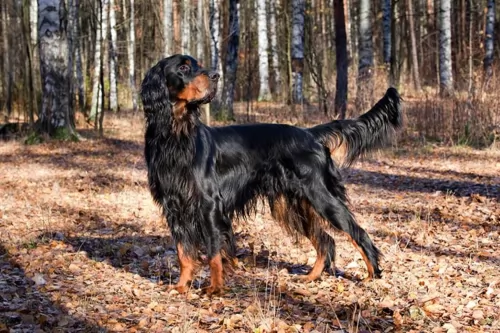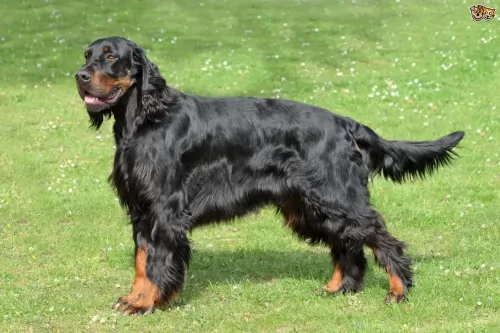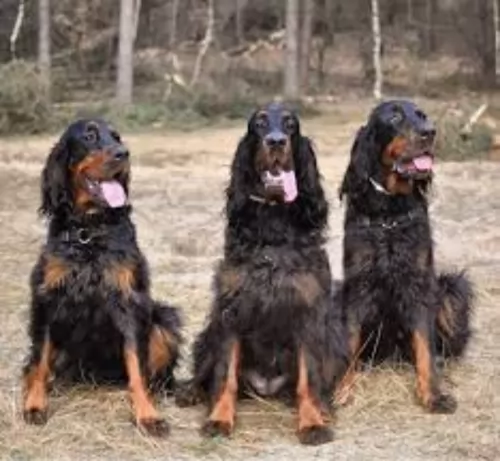 Petzlover
PetzloverCordoba Fighting Dog is originated from Argentina but Gordon Setter is originated from United Kingdom. Cordoba Fighting Dog may grow 8 cm / 3 inches shorter than Gordon Setter. Cordoba Fighting Dog may weigh 19 kg / 42 pounds more than Gordon Setter. Both Cordoba Fighting Dog and Gordon Setter has almost same life span. Both Cordoba Fighting Dog and Gordon Setter has same litter size. Cordoba Fighting Dog requires Low Maintenance. But Gordon Setter requires Moderate Maintenance
The Cordoba Fighting Dog is believed to be an extinct dog breed, but research will reveal that there are still those who believe that some of these dogs do still exist.
The dog was regarded as an aggressive, fighting dog and was a crossbreed of the Mastiff, Bull Terrier, Boxer and Bulldog.
Known also as the Argentine Fighting Dog or the Perro de Presa de Cordoba, this dog comes from Argentina where it was used for dog fighting, hog hunting as well as being a guard dog. It is thought that it became extinct in the 20th Century.
Breeders in Cordoba worked at developing a new fighting breed of dog based on the Bull Terrier. The breed became known as the Perro de Presa de Cordoba or Fighting Dog of Cordoba. He resembled the Bull Terrier and came in shades of fawn and brindle, although Argentine fanciers preferred the plain white dogs.
Over breeding for white coated dogs led to skin problems and other health problems, making it that except for fighting, the dog wasn’t in demand elsewhere. As fighting of dogs became more frowned on, the dog became extinct.
 The Gordon Setter includes mixes of the English Setter and the Irish Setter. The original purpose of the breed was to hunt game birds.
The Gordon Setter includes mixes of the English Setter and the Irish Setter. The original purpose of the breed was to hunt game birds.
The dog breed hails from Scotland with a history that dates back to the 17th century. The dog was developed in Gordon Castle by the Duke of Gordon IV.
The dog became popular among hunters in the early 19th century. He is the biggest of the setter breeds. It was in 1884 that the American Kennel Club recognized the Gordon Setter.
The Cordoba fighting dog is a mixed breed. Bull Terrier, Mastiff and Bulldog make up this dog breed.
He was a large dog, standing at between 58 and 62cm and weighing between 32 to 55 kg. He was lean and muscled with a wide chest and small ears that were cropped. His powerful jaws were to be avoided as once they settled around another dog’s throat, the grip was vice-like. The dog’s coat was short and was essentially white with black marks on the body and around the head.
A Cordoba Fighting Dog is aggressive and strong. While most dogs benefit immensely from training and socialization, these dogs, even with training, remained somewhat aggressive, so they were no doubt not a good choice for first time dog owners, or for those with children in the home. Also the dog was always aggressive towards other dogs.
You could safely say that if these dogs were around today, they would not be looked upon as the ideal family pet.
 The Gordon Setter is a large dog, capable of reaching up to 69cm in height and weighing up to 36kg in weight.
The Gordon Setter is a large dog, capable of reaching up to 69cm in height and weighing up to 36kg in weight.
He belongs to the Setter family and is somewhat heavier than the other Setter breeds. Setter dogs are classified as sporting- or gun dogs. He is a beautiful dog with a pitch black coat with tan markings found around the chest, muzzle and paws as well as those two familiar tan dots above each eye.
Sometimes you can find a small amount of white on the chest. The coat is straight and silky but it can be slightly waved with feathering around the legs, chest, ears and tail. Both the tail and the ears of the dog are also long and feathery. The Gordon has an intelligent, dignified look about him.
The Gordon Setter is a confident, fearless, loyal and affectionate dog. They do well with their human families, when there are other pets in the house as well as children.
He can be a boisterous dog so training and socialization will become necessary. Your Gordon Setter is an intelligent dog and also a dog ready and willing to learn. He is calm and even-tempered but playful too.
He isn’t a dog suited to life in the city if there isn’t an adequately sized garden. He is essentially a country life dog well suited to farms or large fenced gardens.
The Cordoba Fighting Dog was a hunter and also a fighting dog. It was a fierce, aggressive dog, and while he may have formed a bit of a bond with his owner, he wouldn’t have made a good family pet.
With an unstable temperament, who knows when he could have turned on his owner or the owner’s family? Certainly he wouldn’t have tolerated any other pets in the home.
Perhaps it is better if he has become extinct because dog fighting is abhorrent and hopefully being banned today, and he would never have been much good as a family pet.
 Beautiful to look at, the intelligent and even-tempered Gordon Setter has everything to be confident about. He loves the attention he gets from his human family and is always looking for a pat.
Beautiful to look at, the intelligent and even-tempered Gordon Setter has everything to be confident about. He loves the attention he gets from his human family and is always looking for a pat.
He can be stubborn and he certainly won't like the idea of being left cut off from his family for long periods of time as he is a social dog with those he knows and loves.
The Gordon Setter is energetic and playful so he will need regular exercise. When you bring a Gordon Setter into your home, you bring in a wonderfully loyal pet and companion.
The Cordoba Fighting Dog was a generally healthy breed but even so, its very lifestyle made it want to gobble down his food without much chewing. This possibly resulted in a number of problems such as bloat.
Bloat is a serious condition which the Cordoba had to deal with and which happens with modern day dogs too. It is an ailment not to be taken lightly. Your dog will need to get to the vet as soon as possible. The dog’s stomach fills with gas, which can also result in the stomach twisting.
When the stomach fills with gas, pressure is put on the diaphragm, making it difficult for the dog to breathe. The dog’s abdomen is swollen, he has difficulty with breathing and he will likely be drooling. It is an ailment which can happen to any breed of dog, regardless of age. Larger dog breeds, however are more prone to it.
 Life expectancy for the Gordon Setter is usually about 10 to 12 years and with good nutrition and care, your Gordon can easily reach 12 years of age.
Life expectancy for the Gordon Setter is usually about 10 to 12 years and with good nutrition and care, your Gordon can easily reach 12 years of age.
Every dog is prone to some common health issues and these include among others hip dysplasia, gastric torsion or bloat, retinal atrophy and ear infections.
Large dogs are more prone to hip dysplasia. The disease is a malfunction of the hip joints causing pain and loss of function in the rear legs.
This eye conditon just gets worse over time and can lead to vision loss.
An under-active thyroid causes a decrease in metabolism. Symptoms of hypothyroidism in dogs include weight gain, obesity, cold intolerance, changes in the skin and coat like hair loss and your dog is lethargic.
This can be very dangerous with your pet as the stomach is swollen and the stomach rotates and twists and can lead to death.
The Cordoba Fighting Dog was a short haired dog and no doubt his owner would have given him a brush down every now and then to keep him looking presentable.
The Cordoba was used for fighting to the death with other dogs, so a strong dog like this will have required a high-protein diet. The owners particularly wouldn’t have wanted a dog with hip- and elbow dysplasia and they would have ensured a good choice of raw meat, cooked brown rice and vegetables.
Manufactured dog food started emerging about the mid-1800s and the dogs would have been fed this, made up of wheat meals, meat and vegetables which was then mixed with cooked meat and vegetables.
 Gordon Terriers are energetic dogs so he is going to require a good deal of exercise each day. Take him with you on your walks and make sure that you give him lots of ball games and rope games.
Gordon Terriers are energetic dogs so he is going to require a good deal of exercise each day. Take him with you on your walks and make sure that you give him lots of ball games and rope games.
All Gordon Setters shed, and their coat will require a good brushing at least twice a week. Check nails, teeth and ears regularly. Brush teeth at least twice a week to prevent dental decay.
As a working dog your Gordon Setter has a special need for a high fat content diet. You can include some raw meat in his high-energy dog kibble. He can also have some cooked brown rice, chicken and vegetables added into his kibble from time to time. Make sure he has access to fresh, cool water.